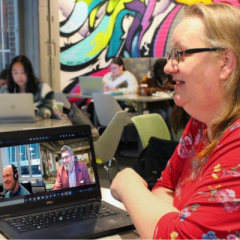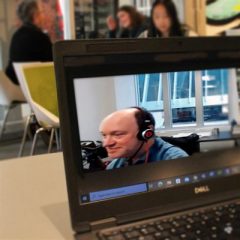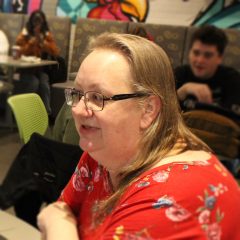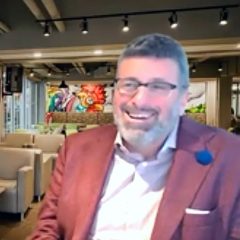From Idea to Impact: The Champions of Carleton’s Dedicated Access Fund
Meet Martin, Deborah, and Sean
We were young, we were noisy, and we didn’t take no for an answer.

In the ‘90s, there was no fund for accessibility initiatives at Carleton University.
Martin Anderson recalls, “When I arrived at Carleton, I went and bought my books in first year and I realized that the bookstore was not wheelchair accessible.” He also had a roommate who was keen to join in orientation activities, but couldn’t, due to accessibility issues.
Martin met fellow student, Sean Wise. “The university was very accessible but only included the academic definition, and Martin and I were social, not just academic.”
Deborah Coghlin, working with Attendant Services, also got involved. “We would sit down, may or may not have been at Roosters with a beer or two, and discuss how we could make things more accessible.”
However, funding was an issue, so Martin asked the university, “If we arrange for that, so that you have the cash, will you make changes, will you give us a voice?” And the university said “Yes.”
The university heard their voices and partnered with the students to create a fund dedicated to advancing accessibility at Carleton.
Thirty years later, the group shares how it all got started…
Martin’s Story

My name is Martin Anderson. I graduated from Carleton in 1994 with a commerce degree. I spent five wonderful years being assisted by the what’s now called the Carleton-Algonquin Residence Attendant Services Program. After I finished at Carleton, I went on and I got a law degree from the University of Windsor and now I’m a constitutional lawyer with the Department of Justice in Toronto.
When I was at Carleton, I was focused on the idea that everybody should have an equal opportunity for all university events and its experiences. There’s so much that you learn in the university outside of the regular classroom.
Martin encountered barriers getting around campus in his wheelchair. He also had a roommate who was keen to join in orientation activities, but couldn’t, due to accessibility issues.
That gave me the idea. If we’re making the university accessible, let’s make the events accessible too, even if it means that we have to give people ASL, captioning, and those types of supports.
Martin worked with fellow students, Sean Wise and Deborah Coghlin, launching a campaign that would lead to the Dedicated Access Fund (DAF). To this day, the DAF funds improvements for physical accessibility on campus, as well as supporting access to university events. Inspired by Ghandhi’s ‘Be the Change,’ Martin shares:
If you think something should be changed, find a way of changing it. Even if it involves working with others, work with others. So many significant things in this country happened when one or two people hooked up and said, ‘Hey, I don’t like this, I think we can change it, let’s go for it.’
When I was at Carleton I was focused on the idea that everybody should have an equal opportunity for all university events and its experiences.
There’s so much that you learn in the university outside of the regular classroom.
Deborah’s Story

I’m Deborah Coghlin, Debb, and I’ve been working for the Attendant Services program since 1988, fighting alongside a lot of people to get things accessible.
In ‘92 I was the coordinator for the Carleton Disability Awareness Centre (CDAC). I already knew Martin because he was one of our clients at Attendant Services, and I was introduced to Sean, because he was working with the Paul Menton Center.
We thought the two offices should maybe work together on things and we would sit down, it may or may not have been at Roosters with a beer or two, and discussed how we could make things more accessible. And so it just all kind of went from there.
In school, it’s more than just what you learn in the classroom. We always tell the story when we have parents that come saying, listen, if your child wants to enjoy Frosh events or orientation events, you know there will be attendants there. So if you want to go in the jello tank to get prizes, we will get you a life jacket.
This year we have some res fellows in one of the houses that have disabilities and they’re able to participate, you know with everybody, just like any other res fellow.
I have students living in residence who now can open the door on their own with the proximity reader that opens the door.
One student from Japan was so excited that he could open the door for his father. That’s something he had never been able to do.
So little things like that were made possible because of the Dedicated Access Fund.
I think some of the things that are still a problem are the ‘I can’t.’
And it’s not other people. It’s the students with disabilities saying, ‘I can’t do that’ because they’ve been told in high school or their parents or whatnot that they can’t do that.
And I’m kind of the person that’s like, ‘What do you mean you can’t? Why not? Just go do it.’
And then they go do it and they’re like, ‘Oh, well, that was really easy.’
And then they’re off on their own. It’s awesome.
Sean’s Story

My name is Doctor Sean Wise. I’m a professor of entrepreneurship and innovation at the Ted Rogers School of Management at Toronto Metropolitan University formerly known as Ryerson.
I am a proud Carleton graduate. I’m a proud alumni of the Paul Menton Center. When I was at Carleton, I worked very hard to expand the definitions and conceptual frameworks around what is a disability. In particular, to highlight that non-visible disabilities are still in need of accommodation. And more importantly, that the university education doesn’t only take place in the classroom.
Martin and I were social, not just academic. And we didn’t feel that everyone was getting the same rights, the same opportunities. And I don’t mean an opportunity to take Psych 100. I mean an opportunity to join a club, an opportunity to see a concert, an opportunity to go to a fraternity house, to go to a house party and whatever is part of a holistic education.
Martin and I and the members of the committee just saw that the disabled student experience ended. It ended at the classroom door. And so we initially asked for support for finances, for a broader definition. And Martin and I and others waged a campaign to illustrate the issue.
I was greatly surprised, not by the ignorance of the masses, but when we brought it to their attention, when we allowed them to experience it, to change perspectives, people didn’t take it well. People wanted students to have those opportunities. And people joined with that campaign. And then Martin and myself and Debb and other people just didn’t let it go.
And it was really that we started this long journey to ensure not just physical accessibilities, not just classroom accessibilities, but so every student could go to Carleton and could choose from the wide variety of experiences available.
It wasn’t for us to decide which events are cool and which events are appropriate and which events we should support. It’s everything. Everything. So that everyone sees that with slight accommodations, with an investment of compassion, everyone can become their best self, not just those who can jump in the jello.
Up until that point, I had only been the victim, the person who was the subject matter. And this opportunity shifted that so I could be the advocate, not just for myself, but for people who weren’t blessed with a loud voice and a desire to express it.
And so none of that would have happened if I kept thinking of myself as a victim and not shifting as an advocate. None of that would have happened if Martin didn’t give me the confidence to open my mouth and speak my truth.
Note: The Humans of Accessibility stories represent personal experiences and views.